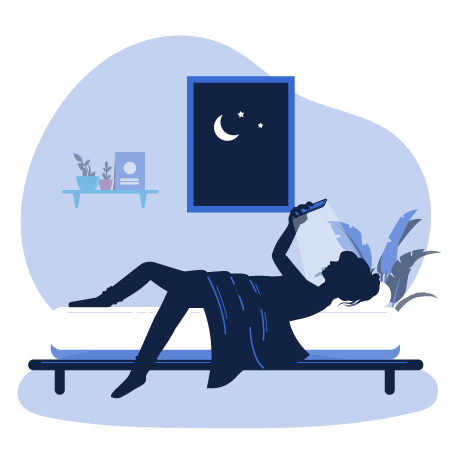Teens and Sleep
 Teens face numerous challenges to getting consistent, restorative sleep. Recognizing those challenges helps teens and their parents make a plan so that teens get the sleep they need.
Teens face numerous challenges to getting consistent, restorative sleep. Recognizing those challenges helps teens and their parents make a plan so that teens get the sleep they need.
Why Is Sleep Important For Teens?
Sleep is vital for people of any age. For teens, though, profound mental, physical, social, and emotional development requires quality sleep.
Thinking and Academic Achievement
Sleep benefits the brain and promotes attention, memory, and analytical thought. It makes thinking sharper, recognizing the most important information to consolidate learning. Sleep also facilitates expansive thinking that can spur creativity. Whether it’s studying for a test, learning an instrument, or acquiring job skills, sleep is essential for teens.
Given the importance of sleep for brain function, it’s easy to see why teens who don’t get enough sleep tend to suffer from excessive drowsiness and lack of attention that can harm their academic performance.
Emotional Health
Most people have experienced how sleep can affect mood, causing irritability and exaggerated emotional reactions. Over time, the consequences can be even greater for teens who are adapting to more independence, responsibility, and new social relationships.
Prolonged sleep loss may negatively affect emotional development, increasing risks for interpersonal conflict as well as more serious mental health problems.
Mental health disorders like anxiety, depression, and bipolar disorder have routinely been linked to poor sleep, and sleep deprivation in teens can increase the risk of suicide. Improving sleep in adolescents may play a role in preventing mental health disorders or reducing their symptoms.
There is no single reason for sleep insufficiency among teens. Several factors contribute to this problem, and these factors may vary from teenager to teenager.
Time Pressure
Teens often have their hands full. School assignments, work obligations, household chores, social life, community activities, and sports are just some of the things that can require their time and attention.
Pressure to succeed while managing these extensive commitments can be stressful, and excess stress has been known to contribute to sleeping problems and insomnia.
Use of Electronic Devices
Screen time late into the evening can contribute to sleeping problems. Using these devices can keep teens’ brains wired, and incoming notifications can cause disrupted and fragmented sleep. Evidence also points to suppressed melatonin production from exposure to the light from cell phones.
Sleep Disorders
Some teens have poor sleep because of an underlying sleep disorder. Adolescents can be affected by obstructive sleep apnea (OSA), which causes repeated pauses in breathing during sleep. OSA frequently causes fragmented sleep and excessive daytime sleepiness.
Mental Health Problems
Mental health conditions like anxiety and depression can be a challenge to quality sleep in teens as well as adults. Insufficient sleep can contribute to these conditions as well, creating a bidirectional relationship that can worsen both sleep and emotional wellness.
Neurodevelopmental Disorders
Neurodevelopmental disorders, such as attention-deficit/hyperactivity disorder (ADHD) and autism spectrum disorder (ASD), can make it harder for teens to sleep well. Lack of sleep may also contribute to more pronounced symptoms of these conditions.
Excerpted from “Teens and Sleep” from the Sleep Foundation. Read the full post online to learn some strategies that can help teens get better sleep.
Source: Sleep Foundation | Teens and Sleep, https://www.sleepfoundation.org/teens-and-sleep | © 2021 OneCare Media, LLC.
Do you need someone to talk to? To schedule an evaluation or to get advice about your child’s challenges, call or email a CHC Care Coordinator at 650.688.3625 or careteam@chconline.org CHC teletherapy services are available now.





